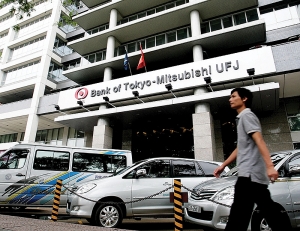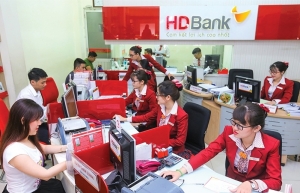INTERNATIONAL INVESTMENT
AND PORTAL
In the context of Vietnamese banking liquidity being quite tense at the present, do you think liquidity constraints lead banks to rush into borrowing from foreign financial institutions?
 Andrew Jeffries, country director of the Asian Development Bank in Vietnam
Andrew Jeffries, country director of the Asian Development Bank in Vietnam
We know there have been increased liquidity demands in Vietnam’s market. The banks have sought the State Bank of Vietnam (SBV) to increase credit in response to what is going on. However, we do not at this time have any fundamental systemic concerns about the safety and soundness of Vietnam’s bank system.
It’s important to see this current demand for liquidity in the global context, where liquidity has tightened in many markets around the world in response to aggressive interest rate increases by the US Federal Reserve and by many other central banks to curb inflation. And the SBV is no exception – it had to raise policy rates twice since the beginning of the year. So, that caused liquidity concerns and tightening globally. This is not just a Vietnam-specific issue.
What criteria must Vietnamese banks meet to be able to borrow capital from international financial institutions?
We consider a number of factors. First and foremost is that the bank has to be credit-worthy, so we evaluate their repayment capacity and the strength of their underlying assets. Our loans to banks are non-sovereign, so there’s no government guarantee behind them. So creditworthiness is the primary consideration.
Secondly, we want to work with banks that align with our development priorities. More specifically, we consider how the proceeds will be used, because of our being a development bank and not a commercially oriented bank. Our purpose for being in Vietnam is not to make a profit as we are a non-profit bank. Our aim is to promote the socio-economic development in Vietnam.
We like to fund activities that have a wider social development angle to them. More specifically, the use of proceeds for purposes such as green infrastructure, and supporting small- and medium-sized enterprises, enterprises that were disproportionately affected by the pandemic.
Thirdly, from the perspective of the borrowing bank, we seek high standards of corporate governance and financial management. We are also interested in the environmental and social impact of the projects they fund through our our loans.
 Businesses can diversify their funding so as to not rely on any single source, photo Dung Minh
Businesses can diversify their funding so as to not rely on any single source, photo Dung Minh
Besides the banks, many businesses across Vietnam also have the desire to access capital sources. Could you share some recommendations for businesses here to access such loans from foreign institutions?
Our loans are in US dollars. So for a Vietnam-based company, whose revenues may solely be in VND, foreign exchange risk is an important consideration. When we look at private companies as potential borrowers, one important issue that foreign lenders have is concern about is the transparency and the financial disclosures of the local investees.
So, I think the first step for a local business that seeks international financing would be to consider having their financial statements prepared in English and by one of the large international accounting firms.
Secondly, it would be preferable if their financial statements could be presented according to both generally accepted accounting principles and International Financial Reporting Standards (IFRS). This would help local businesses be easier evaluated by, and more attractive to, international lenders.
Another factor to consider is that the government has an overall annual cap on foreign borrowing from international banks in hard currency. There’s an application process through the SBV for access to such loans. So, potential borrowers need to be aware of that as well.
Does it seem that smaller banks in Vietnam find it more complex to access loans from financial institutions compared to larger ones?
This mainly depends on the borrower, but we have actively worked with a number of banks and are looking to expand our partnerships, though all such lending has to be approved by the SBV.
We are interested in further expansion because banking is a vital part of the Vietnamese economy, which is experiencing fast growth, fast-growing businesses, and a need for a lot of investment.
What are the benefits of directly borrowing from foreign financial institutions for the Vietnamese economy?
There are several benefits. The first is that it diversifies the business's funding, helps them be less reliant on any single funding source, and strengthens resiliency.
Notably, some large companies in Vietnam have reached their single-borrower limits from local banks. Therefore, this diversification of funding sources becomes one benefit.
Another benefit is the potential to raise the profile of the firms. Foreign banks have rigorous due diligence procedures particularly for cross-border lending. Foreign firms meeting these diligence criteria helps to signal to other potential partners that they are operating at a high level. Thirdly, depending on the bank or type of investment, there are opportunities to learn. For example, many local banks have benefited from international banks both investing in their equity and sharing their international banking practices with their local partner.
On December 14, the US Federal Reserve boosted its benchmark rate to its highest level in 15 years, indicating that the fight against inflation is not over. What impact does this have on Vietnamese bank market liquidity?
In terms of the Fed raising interest rates, firstly it puts pressure on currencies against the US dollar, leading to a stronger US dollar, which impacts many currencies around the world, and the VND is no exception.
In the year to date, the VND has already dropped by nearly 9 per cent against the US dollar, much lower than many other currencies, though it has since somewhat recovered.
Highly indebted countries are currently very vulnerable. However, Vietnam has a relatively low level of public debt compared to the other many countries.
Specifically, Vietnam’s public debt was about 43 per cent of the GDP in 2021. Moreover, the country’s macroeconomics remain stable, and its growth rate is positive at present.
The impact of the Fed's interest rate hike forced many central banks, including the SBV, to raise interest rates as well. I cannot predict the future, as there are signs that inflation in the US is slowing, which means the Fed may not keep raising rates as it did this year, or at least at a slower pace.
In Vietnam, depending on domestic and global conditions, the SBV may have to raise interest rates again, which makes borrowing costs for local businesses higher and will negatively affect liquidity. As mentioned, however, we do not see a systemic problem now.
 Domestic banks gain CPTPP benefits
Domestic banks gain CPTPP benefits
The Comprehensive and Progressive Trans-Pacific Partnership is expected to bring in fresh opportunities for international banks in Vietnam, as well as possible merger and acquisition deals with local partners.
 Domestic banks take cautious FOL approach
Domestic banks take cautious FOL approach
The current pandemic has not only put mounting pressure on the quality of Vietnamese banks’ assets and profitability but also dampened some lenders’ cross-border mergers, forcing them to take different solutions regarding their foreign ownership limit.



















